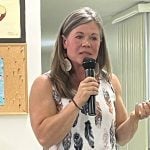Act of God clauses made life miserable for pulse crop traders in 2010.
“This past year was both an eye opener and quite a disappointing year in terms of the act of God,” said Kevin Dick, president of All Commodities Trading Ltd.
Some traders who signed forward contracts with buyers and growers were forced to buy more expensive product on the open market after harvest because the clause excused growers from fulfilling their contracts due to flood damage.
Dick, who was one of the presenters at Pulse Days 2011, said it was a bad year for everybody.
Read Also

Alberta may eliminate marked fuel
Alberta may soon stop selling dyed gasoline and diesel.
Some growers who opted to sign lentil contracts without act of God clauses to get the extra one cent per pound couldn’t produce a No. 2 lentil and were forced to buy product at 30 cents on the spot market only to watch prices drop back down to 25 cents.
He doesn’t know how the trade will approach new crop contracts in 2011 given the rough ride they experienced in 2010.
“I know that producers don’t want to plant (a crop) without an act of God, but I know that the trade wants a deferred delivery contract,” he told growers during a lentil market outlook session.
Kevin Hursh, moderator of the session, said as a grower he is hesitant to sign a contract without the act of God protection.
“We’ve got enough things to worry about without that going sideways,” he said.
Marlene Boersch, managing partner of Mercantile Consulting Ventures Inc., said she can empathize with both sides of the debate.
“It might be healthy to do a little bit of rethinking about that (issue) and spreading the risk between the two a little bit,” said Boersch.
Hursh asked her if that means writing a contract where half of the contracted bushels fall under a straight deferred delivery contract and half are subject to an act of God clause.
Boersch said there needs to be a risk-sharing device so that one party isn’t shouldering the entire burden.
“If you can find the mechanism to spread that risk, I think it would help the industry stabilize,” she said.
Dick wondered why special crop traders are pressured to include the clause while traders of other crops, such as canola, are not.
Boersch said canola growers can use futures markets to help mitigate their risks.
Craig Zawada, managing director of Saskatoon law firm WMCZ, said 2010 was undoubtedly a bad year for special crop buyers who included the clause in their contracts.
“I’m sure that there were a lot of buyers that were stung.”
He expects smaller buyers were hurt more than large processors because they don’t have the clout to insist on leaving the clause out of the contracts.















